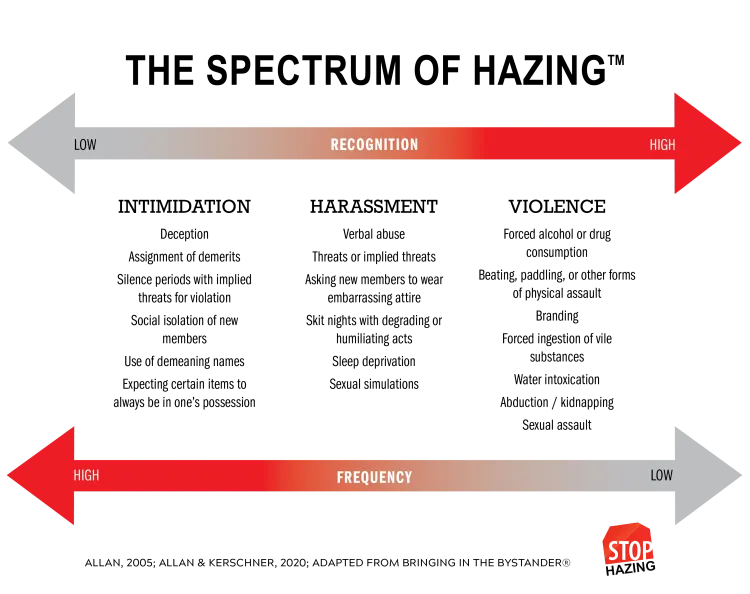What is hazing?
What is hazing?
The University of Vermont's Hazing Policy defines hazing as:
...any act committed by a person, whether individually or in concert with others, against a student in connection with joining/pledging, being initiated into, affiliating with, holding office in, or gaining or maintaining membership in any organization that is affiliated with the University; and has the effect of socially or physically isolating, humiliating, intimidating, or demeaning the student or having the effect of harming or potentially harming the mental or physical health of a student.
Hazing also includes soliciting, directing, aiding, or otherwise participating actively or passively in such acts. It may occur on or off campus, and regardless of the consent or willingness of a person to participate in the activity. Hazing unreasonably interferes with academic, programmatic, and employment activities, and includes activities that are in violation of University policies and Vermont law.
Hazing does not include any activity or conduct that furthers legitimate curricular, extracurricular, or military training program goals, provided that:
- The goals are approved by the organizations’ official university advisor, coach, etc.
- The activity or conduct furthers the goals in a manner that is appropriate, contemplated by the University, and typical and customary for similar programs at other educational institutions.
Identifying Hazing
Questions to Ask Yourself
- Would I feel comfortable participating in this activity if my parents were watching?
- Would we get in trouble if the Dean of Students walked by?
- Am I being asked to keep these activities a secret?
- Am I doing anything illegal?
- Does participation violate my values or those of my organization?
- Is it causing emotional distress or stress of any kind to myself or others?
- If someone were injured, would I feel comfortable being investigated by the insurance carrier?
- When I apply for jobs, can I take the onus of having a criminal arrest on my record?
Types of Hazing Behavior
The following set of examples (conducted as a condition of joining, affiliating with, or maintaining membership) represents hazing conduct that can diminish one’s sense of membership and/or breach reasonable standards of mutual respect within the team or organization. These activities can also be a warning sign of the risk of more dangerous behaviors being undertaken by member(s) of the group or organization:
- Participating in exercise unrelated to a sport, or considered extreme
- Associating with specific people, but not others
- Performing acts of servitude
- Shaving of the head or any other part of the body
- Conducting scavenger hunts or quests
- Engaging in public stunts that are potentially humiliating or degrading
- Wearing apparel that is conspicuous and not within community norms
- Making prank calls
- Needing to possess certain items at all times
- Depriving privileges granted to other members
The following set of examples (conducted as a condition of joining, affiliating with or maintaining membership) represents hazing conduct considered aggravated due to the risk of harm created. These activities can place persons at risk of serious physical and/or psychological harm. Such conduct may result in more serious University sanctions as well as criminal prosecution.
- Undergoing tattooing, piercing, or branding
- Engaging in or simulating sexual acts
- Engaging in sexually violent or sexually harassing behavior
- Threatening or causing physical restraint or abuse (including but not limited to being held down, tied up, taped, or confined in a small space)
- Consuming any substance
- Kidnapping, or transporting and/or abandoning, a person
- Conducting interrogations
- Being nude in a public or private place
- Causing excessive fatigue through physical or psychological abuse
- Furnishing alcohol or illegal substances to minors, or facilitating consumption of alcohol or use of illegal substances by any person
- Damaging, destroying, or stealing property
- Identifying hazing targets or subjects on the basis of their actual or perceived race, color, religion, national or ethnic origin, age, sex, sexual orientation, marital status, disability, gender identity and expression, veteran status, or other legally protected classification.
The "Spectrum of Hazing"
In the “Spectrum of Hazing” graphic below, it can be seen that hazing takes many forms. The three typical categories of hazing are intimidation, harassment, and violent hazing. Research suggests that sometimes the most common forms of hazing (intimidation, high frequency) are the least recognizable, though all forms of hazing are potentially mentally, emotionally, and/or physically harmful.
